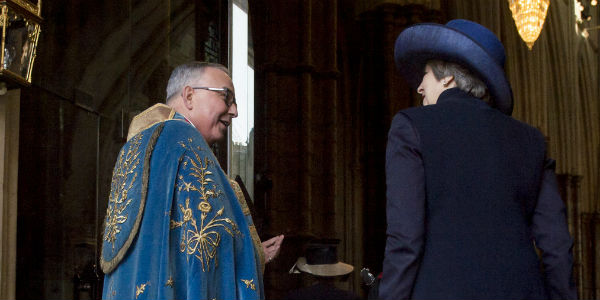She does God: Theresa May, a PM with strong views but little ideology
The daughter of a High Anglican vicar, Theresa May describes herself as a “practising Christian”. In an edited extract from The Mighty and the Almighty: How Political Leaders Do God, Nick Spencer examines what we can glean about the influence of her Christianity on May’s politics.

Theresa May arrives at Westminster Abbey, March 2017. Photo: Number 10 via a CC-BY-NC-ND 2.0 licence
Margaret Thatcher was unashamedly public about her faith, rooting her political outlook in her religious one, and unafraid to assume the pulpit when the occasion demanded, or even when it didn’t. Theresa May, on the other hand, is rather more circumspect, not only about her faith but also her personal life.
May has said on several occasions – although admittedly not as many as Margaret Thatcher – that she owed a lot to her father. Hubert Brasier was Chaplain of All Saints’ Hospital, Eastbourne, when May was born. The family subsequently moved so that he could take up the post of Vicar of Enstone with Heythrop, and then moved again to St Mary the Virgin in Wheatley, Oxfordshire in 1970. According to the Financial Times, parish records and interviews with former members of his congregation reveal an image of “a local vicar whose seriousness, conservatism, High Anglican beliefs and steadfast devotion to duty left an indelible imprint on his only child.”
May’s early life naturally revolved around the parish. She attended her father’s church and taught some Sunday school classes there, even going back to attend the annual meeting of the parochial church council when she had left for Oxford (which was, admittedly, not far away). She insisted that her father never “imposed” his Christianity on her as a child and her parents “always said to me, that obviously they would very much like it if I were a regular churchgoer and so forth but they weren’t going to force me to go.”
As a consequence of this parental latitude, she attended “of my own choosing”, the result being that, unlike some friends who were clergy daughters but who felt under more compulsion and therefore “kicked over the traces”, she remained and remains a practicing Anglican. “I do call myself a Christian, and I am still a practising member of the Church of England,” she told Desert Island Discs. It was a faith that she grew into. There was never any “blinding flash” or “point in time at which I can say I decided to be a Christian.” Rather, there was “a positive process” in “accepting” the strong, family “Christian faith” within which she grew up. The Christian faith is “part of who I am and therefore how I approach things…[it] helps to frame my thinking and my approach.”
She cited her father for the fact that “his job wasn’t just doing services on Sunday mornings” but for being “very good at visiting people in the village.”
Such a model might have led her politically left or right, but May has indicated how her Christianity in fact led her to Conservatism. Reaching political maturity in the 1970s, she was faced with “a clear-cut choice between Conservatism and Socialism”, and although there were plenty at the time who put forward a forceful “Christian moral argument” for socialism, she felt that the left and, in particular, “its extreme form, communism” denied the value of the individual and was therefore less consonant with Christian beliefs: “it actually isn’t based on what I would call ‘Christianity’.” By contrast, she believed that Conservatism offered a better recognition of “the value of the individual” but also of “their relationship with others in society and their need to contribute to a society, to be part of that greater thing.”
This second, corrective point seems important to May because she acknowledged that the back end of the Thatcher/ Major years – being the time when she twice failed in her attempt at getting a seat, partly on account of Tory unpopularity – was a difficult time in which the value of the individual as individual had been taken too far.
“The central tenet of my belief is that there is more to life than individualism and self-interest”, she told her Conference audience in 2016. “We applaud success…but we also value something else: the spirit of citizenship… We form families, communities, towns, cities, counties and nations [and] have a responsibility to one another”, she said, a responsibility that government also shares.
Without ever abandoning the core creeds of individual worth and opportunity, which May had stressed had brought her into politics, it was a speech located in a clear commitment to relationally-rooted individuals, served by a positive vision of “the good that government can do”, and all framed as a rejection of “the ideological templates provided by the socialist left and the libertarian right”, without every daring to utter a phrase like the middle or third way.
How far is any of what we see in Prime Minister May traceable to her Christian convictions? The apparent consonance between the two, in as far as we can accurately identify it, suggests the answer might be a great deal, but that is liable to get Theresa May wrong, just as it is liable to get the relationship between the Almighty and Mighty wrong. Politicians, not least leading ones in modern, plural democracies, tend not to construct their political edifices simply according to their spiritual blueprints.
May is a politician with strong views rather than a strong ideology, and those views were seemingly shaped by her Christian upbringing and faith. That Christianity gives her, in her own words, “a moral backing to what I do and I would hope that the decisions I take are taken on the basis of my faith.” It is a faith, she went on to say in interview, that “‘informs’ those decisions”, a phrase that she immediately went on to apologies for, for being “terribly jargonistic”. Christianity “helps to frame my thinking and my approach” she told Desert Island Discs, before going on to say that it is “right that we don’t flaunt these things here in British politics”. In this regard at very least, May practices what she preaches.
This post represents the views of the author and not those of Democratic Audit. It is an edited and condensed extract from The Mighty and the Almighty: How Political Leaders Do God, published by Biteback Press. Reproduced with permission.
 Nick Spencer is Research Director of the religion and society thinktank Theos. Also by Nick: ‘They shall reap the whirlwind: how Churchill harnessed Christianity in the service of war.
Nick Spencer is Research Director of the religion and society thinktank Theos. Also by Nick: ‘They shall reap the whirlwind: how Churchill harnessed Christianity in the service of war.





 Democratic Audit's core funding is provided by the Joseph Rowntree Charitable Trust. Additional funding is provided by the London School of Economics.
Democratic Audit's core funding is provided by the Joseph Rowntree Charitable Trust. Additional funding is provided by the London School of Economics.